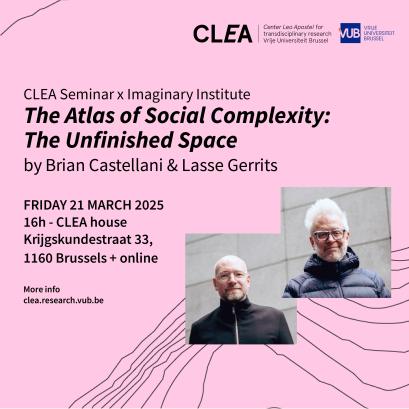About the seminar
The Imaginary Institute calls for a radical rethinking of how we create the conditions for new ideas – how we build spaces that invite the unknown, where knowledge is not a monument but an ever-expanding terrain. In this session, we turn to the final chapter of Brian Castellani and Lasse Gerrits' The Atlas of Social Complexity, The Unfinished Space, which emerged from 41 interviews with scientists, artists, and practitioners across politics, law, physics, sociology, and beyond. Their collective concern? How do we ensure that the study of social complexity remains disruptive, refusing ossification, always on the edge of new discoveries? The answers align with the ethos of the Imaginary Institute: unfinished spaces, where knowledge remains open-ended; the art of incompleteness, embracing uncertainty; unease and discomfort, resisting closure; rhizomes, networks without hierarchy; permeability and pores, keeping disciplines porous; the terrain not yet grasped, always pushing beyond; organizing emergence, cultivating generative collaborations; becoming transdisciplinary, transcending intellectual silos; and becoming educated, shaping how we learn complexity. Our goal of this seminar is to explore these themes with the group to share our various experiences around creating the conditions for the manifestation of urgent new ideas, to envision beyond the present and bring forth what does not yet exist.
About the speakers
Brian Castellani is Director of the Research Methods Centre and Co-Director of the Wolfson Research Institute for Health and Wellbeing at Durham University, UK. He is also Adjunct Professor of Psychiatry (Northeastern Ohio Medical University, USA), CO-I for the Centre for the Evaluation of Complexity Across the Nexus, Visiting Professor, Nelson Mandela University (South Africa) and a Fellow of the UK National Academy of Social Sciences. Brian also runs the EnvironMental Health Nexus, which puts the social in front of the science to create healthy spaces for healthy minds. Brian is trained as a health sociologist, clinical psychologist, and methodologist. His work is in complexity science and its application to health and public policy. See his recent book with Lasse Gerrits, The Atlas of Social Complexity.
Lasse Gerrits is professor of Governance of Complex Urban Transformations at the Institute for Housing and Urban Development Studies (IHS) at the Erasmus University Rotterdam and the academic director of the institute. He leads the PhD program and holds the final responsibility for the academic quality of research and higher education at the IHS. His research expertise includes social science research methods, complexity sciences, systems theories, urban planning, transformations, development, governance, and temporary use, infrastructure development and qualitative comparative analysis.
Advanced reading material for the seminar
In preparation for the seminar, the speakers have generously provided the PDF of the chapter The Unfinished Space. You are invited to read the chapter beforehand, although it is not a prerequisite for joining.
Practical
This CLEA x ii seminar is taking place simultaneously at the CLEA house and online (via Zoom) and is open to everyone interested!
When. Friday 21 March, 2025 at 16h
Where. Center Leo Apostel (CLEA house), Krijgskundestraat 33, 1160 Brussels
Online. Please join via Zoom:
Link: https://us06web.zoom.us/j/89940890149?pwd=7UluVaE16yUsoaRLc4qQ6EtxnsoS5P.1
Meeting ID: 899 4089 0149
Passcode: 493898

